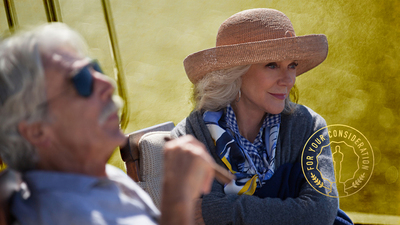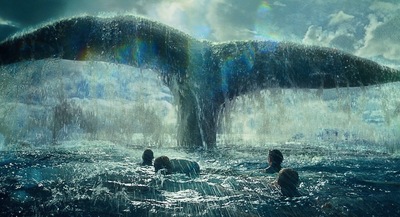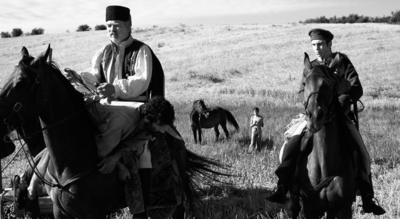
BY MATTHEW ENG |
THE WANNABE Director Nick Sandow Talks Mob Movies, Patricia Arquette, and Scorsese's Influence
The ORANGE IS THE NEW BLACK actor gets in the writer-director's chair for this 2015 Tribeca world premiere, now in theaters and on VOD.

You'll probably best recognize Nick Sandow as a man in the land of women, i.e. Litchfield Prison's perpetually miserable executive assistant Joe Caputo on Netflix's radical drama Orange is the New Black. An industry veteran with over sixty credits to his name across screens both big and small, Sandow recently returned to the director's chair (following his 2011 off-track betting drama Ponies) with The Wannabe, a warmly empathetic, giddily engrossing, yet undeniably odd new romantic drama which made its world premiere at the 2015 Tribeca Film Festival and which Sandow also wrote.
A rollicking, real-life crime story of mob culture and amour fou, The Wannabe follows Tommy (Vincent Piazza, aka Boardwalk Empire's Lucky Luciano) and Rose (Boyhood's Patricia Arquette, in one of her first post-Oscar film roles), a couple of married, Gotti-obsessed ex-cons who get their moment in the sun when they begin robbing New York's mafia elite in the early nineties. Sandow's experiences in the character actor trenches are on full display here, as he coaxes out a convincingly toady and ultimately tender performance from Piazza, as well as a committed and deeply moving turn from Arquette, who is in fine form (and a brown wig) while playing a druggy Bonnie to Piazza's volatile Clyde with delicious "neighborhood girl" realness.
We spoke to Sandow about revitalizing mob culture in the movies for a post-Sopranos audience, foregrounding a female character in a genre that’s typically male-driven, the influence of Martin Scorsese (who executive produced the film), and, of course, what's in store for Litchfield's finest in Orange's impending fourth season. The Wannabe is now playing in limited release and is also available on VOD.

The East Coast mob drama is certainly well-trod territory both in film and on television. The Wannabe tells such an odd but incredibly interesting true-life story with a genuinely unique connection to mob culture. What drew you to it and what do you feel it adds to the genre?
I was attracted to the idea of this outsider, the guy who desperately wants to be inside something. The idea of desperately wanting to be something you’re not is something that’s profound and runs through our culture. And I loved the idea of this person wanting to be inside this world that one knows from film and cinema mostly. And the thing [about] Thomas is that he’s grown up in a neighborhood [where] that world is very real for someone… I grew up in a neighborhood very similar to Thomas that’s five minutes away actually, in the Bronx. So, that world is very real, but it’s very, very different from what we see in the movies. So I was fascinated by the contrast of that. And I love the idea of making him this cinephile-gangsterphile and the combination of that and what kind of lethal cocktail that can be. [The Wannabe] is almost a comment on the genre in a way.
It’s rare to see female characters in mob dramas as centralized in the narrative or as vividly performed as Patricia Arquette’s Rose is in this movie. How did Patricia come onboard the project and what did she contribute to the character?
[Patricia] came on early. We had the script and we started thinking about casting. I wanted that character always to be older, to have a good amount of age on Thomas. And that was rough. That was a rough go because people would say, “You know, it’d be easier if you cast them around the same age,” as far as getting financing and stuff like that. But I was committed to that. And in talks, Patricia’s name came up and I was like, Wow! I just thought of her and the roles she’s done. And then I was talking to my friend Michael Imperioli [who has a small but affecting part in The Wannabe as Thomas’ wary older brother] and I said, “Michael, you know, somebody brought up Patricia Arquette’s name.” And he said, “Oh, I just did a movie with her in Germany! I’ll send her the script!” I thought, Great! I had no idea he had just worked her. And he sent her the script and she loved it and jumped onboard. And this was, of course, pre-Oscar and she was very excited about it and we started talking early on about the role.

It’s one thing to have the single-character, protagonist fanatic, you know. We’ve seen that, we’ve seen the Travis Bickle and the Rupert Pupkin. But it’s another thing to have a couple. And that was a great challenge, to find what it was that was driving Rose. And I think that Patricia immediately attached herself to this sort of maternal aspect of the relationship and this sort of want or this compulsion to deliver him in some way from what he [wanted] and needed from this world. And she was also great at [helping] us find [Rose’s] past and knowing that this character has been through this world. She was a great help. She’s just amazing. And I think the other thing she brings to everything is she’s just so grounded. She’s just so connected to what’s real. It’s like there’s no acting. She just drops in and is so present… She’s a force.
The love affair between Tommy and Rose has such a poignant and immediate emotional reach between the characters and the audience. It's clearly the heart of the movie. How important was it to you to establish this emotional bond, especially in a genre that doesn't always have much time or interest in this type of intimate, lived-in romance?
That was a challenge because, in script form, there were so many times people would try to lead me away from the love story commit to it not being that and gear it more towards being about Thomas’ obsession. And that was always a challenge. But, for me, I couldn’t let it go. I remember having my script sessions and then waking up in the middle of the night saying, “No, I can’t let go of this love story! This is it, this is what it’s about!” So, I think there was something probably very personal about wanting to make that palpable and central to the film. Because I just refused to let it go. And, again, it was a way to try to defy the genre.

How did you go about building and detailing the film’s central relationship both in the writing stage and during filming between Vincent and Patricia? Did you encourage them to research the actual Tommy and Rose?
I didn’t encourage [research] and they really had no interest in delving into their history. They just thought that wasn’t important. So we were all on the same page with that. Early on in the script process, Vincent and I would be in L.A. and then we would hook up with Patricia and spend some time… And then those guys spent some time on their own, developing their relationship, you know, just sort of trying to form that intimacy with each other. And we had very little rehearsal time. But the rehearsal time we did have, that was sort of the focus.
You know, actors, when they’re playing lovers, there’s always that awkward time where, Okay, now we have to actually hold each other and be with each other in a way that says we’re madly in love and we are desperate for each other. So I think some of the rehearsals helped with that. I certainly built the script in and around both [Vincent and Patricia’s] wants and desires for that relationship. I did a lot of script rewrites with notes from both of them about what was important in that relationship to make it more personal and intimate for them.
Your executive producer Martin Scorsese is considerably well-versed in the mob genre, to say the least. How did he become involved in the film and what did he offer the production?
Early on, I got the script to Vincent and he had done a reading — I didn’t know him yet — but he did a reading and I thought he was just amazing. And, wildly enough, a week later we were both shooting Boardwalk and I was in a scene with him. And he was like, “Hey man, I love that script! What are you doing with it?” And I said, “Well, I’m thinking of selling it… and I want to direct it.” And he said, “I’ll produce it! So, let’s do it!”
So shortly after that, we both started working on the script together and we started trying to get it around. And he said, “I’m gonna try to get it to Marty.” And he did! He sent it off to Marty with a bottle of wine. They had a relationship from Boardwalk. [Scorsese served as an executive producer on Boardwalk Empire and won an Emmy in 2011 for directing the pilot.] And then the next season was beginning and they were doing the first table read and Marty came in and said, “The Wannabe — I love it! What do you want me to do?” So [Vincent] said, “Would you exec it?” And he was like, “Sure! Go see my agents [and] lawyers in L.A.” And that’s what we did.
And we already had the foundation, we already broke ground on getting money. We had a lot of people involved, a lot of people interested. And, you know, that was moving along, so as soon as Marty came onboard — that was it. We are a go. We were up and running. The checks were written. [Laughs] He’d been the big central force! And he gave us some notes on the script. And then, during the process, I worked with him in the editing period. He was amazingly generous with his time and his ideas and thoughts… You know, when you get script notes, a lot of people have their own agendas. With Marty, it was not that. He was always pushing me to tell the story I wanted to tell and to get closer to that. And then sometimes he was extremely specific and he’d say things like, “You know, that shot… if you go three frames later, I think you…” And then I’d be editing and I’d move it three frames later and it’s like, Jesus, how the hell did he do that? He’s just the master.
I assume Scorsese’s films were massively influential to you, but were there any other films and filmmakers who particularly inspired you on this project?
I had a couple of films. There’s an Italian film called Salvatore Giuliano that I watched and for some very reason was very much in my head. And another Italian movie called Mafioso. It had this line of comedy and realness that I just wondered, Wow, how did they get these two elements together? And I think Mean Streets was a big influence too, because you never really could find a narrative in it, but it didn’t matter because you were just with these people. There was a poetry there.
I’d be remiss if I didn’t ask you about Orange is the New Black. Last season, Caputo became the first male character to receive a flashback episode. And the last time we saw him, he had betrayed the staff union and accepted a promotion from the private company that owns Litchfield. What’s in store for this season? Are you allowed to share anything?
I think the stakes get higher. And for Caputo, the screws get tighter. We’re working on episode thirteen and we just finished eleven and twelve. And I don’t know, I think Jenji… They put us in Drama [for the second] season, you know. [This year, the Television Academy determined that Orange must compete in drama categories for season two and all future seasons after qualifying as a comedy for its first season.] And, I’ll tell you, she really went for it in that department. I don’t think there’s gonna be any confusion. It’s really intense, it gets really, really intense. And I think I can say that... [Laughs]
Do you feel like you’ve changed at all as an actor since becoming a writer-director?
I think I have. Even now, on set, I see everything. I just know more and more the reason for everything. And I think that it’s made me more efficient as an actor. In a way I may have fought things an actor, like the constraints of film. And as a director, I just let go. I know when we’re gonna be out of that scene and when to make my moments and when to not bother and when to save it. Just sort of detailed stuff like that. I think only directing and editing can really, really help you [as an actor]. And I think I’ve become more generous to the people around me because I know how damn hard it is.

